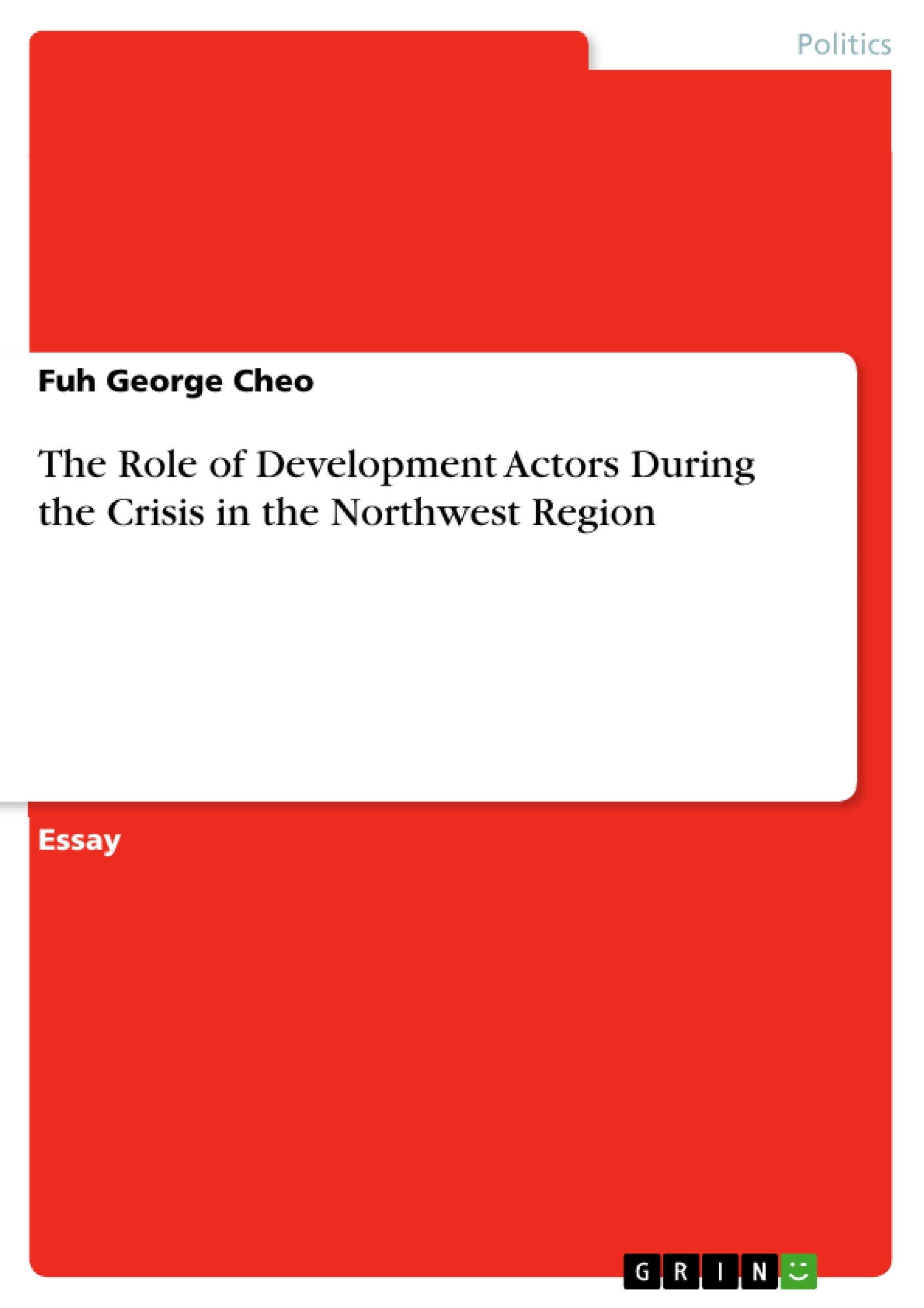The crisis in the Northwest Region of Cameroon has been ongoing since 2016, with violent clashes between separatist groups and government forces leading to a humanitarian crisis. Development actors have played a critical role in responding to the crisis, providing vital assistance to those affected by the conflict. This article examines the role of development actors during the crisis, including their contributions and challenges faced in delivering aid.
Development actors, including international organizations such as the United Nations and non-governmental organizations (NGOs), have been instrumental in responding to the crisis in the Northwest Region of Cameroon. These actors have provided essential services such as healthcare, education, food assistance, and protection to those affected by the conflict. They have also worked to promote peacebuilding and conflict resolution efforts in the region.
One significant challenge faced by development actors has been access to areas affected by the conflict. The security situation in the Northwest Region has made it difficult for aid organizations to reach those in need, particularly in rural areas. In addition, there have been reports of aid workers being targeted by armed groups, further complicating efforts to deliver aid. Another challenge has been funding and coordination. While development actors have mobilized significant resources to respond to the crisis, funding gaps remain. This has limited their ability to provide comprehensive assistance to those affected by the conflict. Despite these challenges, development actors have made significant contributions toward addressing the humanitarian crisis in the Northwest Region of Cameroon. Through their efforts, they have helped alleviate suffering and promote stability in a region plagued by violence and instability.
Inhaltsverzeichnis (Table of Contents)
- Introduction
- Roles of development actors during a crisis
- Impact of the Crisis on the Northwest Region
- The intervention of Humanitarian Development Actors
Zielsetzung und Themenschwerpunkte (Objectives and Key Themes)
This article examines the role of development actors in responding to the ongoing crisis in the Northwest Region of Cameroon, specifically focusing on their contributions and challenges faced in delivering aid. The text aims to provide insight into the complexities of providing humanitarian assistance in a conflict zone and highlight the importance of coordinated efforts in addressing the needs of affected communities.
- The critical role of development actors in providing humanitarian assistance, promoting early recovery, and supporting long-term development efforts.
- The impact of the crisis on the Northwest Region's education system, economy, and human rights situation.
- The challenges faced by development actors in delivering aid due to ongoing violence, insecurity, and limited access.
- The importance of coordinating aid efforts and engaging affected communities in the response process.
- The need for sustained funding and international cooperation to address the humanitarian crisis.
Zusammenfassung der Kapitel (Chapter Summaries)
- Introduction: The article introduces the concept of development actors and their crucial role in providing support during crises. It emphasizes the need for coordinated efforts and community involvement in ensuring effective aid delivery.
- Roles of development actors during a crisis: This section outlines the key roles of development actors in crisis situations, including providing humanitarian assistance, promoting early recovery, and supporting long-term development efforts.
- Impact of the Crisis on the Northwest Region: This section explores the severe impact of the ongoing crisis on the Northwest Region of Cameroon, highlighting the decline in economic activity, displacement of people, and breakdown of essential social services.
- The intervention of Humanitarian Development Actors: This section examines the various development interventions implemented to address the crisis, outlining the roles played by international organizations, NGOs, and local civil society groups in providing emergency relief and supporting long-term development initiatives. It also acknowledges the challenges they face in delivering aid, such as ongoing violence, limited access, and funding constraints.
Schlüsselwörter (Keywords)
The main keywords and focus topics of this text include development actors, humanitarian assistance, crisis response, conflict, Northwest Region of Cameroon, displacement, education, health, human rights, NGOs, international organizations, coordination, funding, challenges, and community engagement.
What is the cause of the crisis in the Northwest Region of Cameroon?
The crisis, ongoing since 2016, stems from violent clashes between separatist groups and government forces, leading to a severe humanitarian situation.
Who are the main development actors in this region?
Key actors include international organizations like the United Nations, various non-governmental organizations (NGOs), and local civil society groups.
What services do development actors provide during the crisis?
They provide essential services such as healthcare, education, food assistance, protection for the displaced, and support for peacebuilding efforts.
What are the biggest challenges in delivering aid in Northwest Cameroon?
Major challenges include restricted access to rural areas due to insecurity, the targeting of aid workers by armed groups, and significant funding gaps.
How has the crisis impacted the local economy and education?
The conflict has led to a decline in economic activity, the displacement of thousands of people, and a near breakdown of the formal education system in the region.
Why is coordination important for development actors?
Coordination ensures that aid is delivered efficiently without duplication and that the most vulnerable populations are reached despite the dangerous environment.



